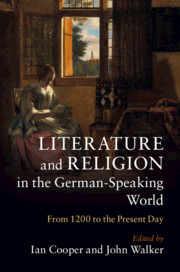Book contents
- Literature and Religion in the German-Speaking World
- Literature and Religion in the German-Speaking World
- Copyright page
- Contents
- Figures
- Contributors
- Introduction
- Chapter 1 Pagan, Christian, Secular
- Chapter 2 Literature and Religion in the Holy Roman Empire 1450–1700
- Chapter 3 German Literature and Religion 1700–1770
- Chapter 4 Literature and Religion in Germany 1770–1830
- Chapter 5 Culture, Society and Secularization
- Chapter 6 Religion in German Modernism 1900–1945
- Chapter 7 German Literature and Religion 1945 to the Present Day
- Notes
- Bibliography
- Index
Chapter 5 - Culture, Society and Secularization
Literature and Religion in the German-Speaking World 1830–1900
Published online by Cambridge University Press: 14 September 2019
- Literature and Religion in the German-Speaking World
- Literature and Religion in the German-Speaking World
- Copyright page
- Contents
- Figures
- Contributors
- Introduction
- Chapter 1 Pagan, Christian, Secular
- Chapter 2 Literature and Religion in the Holy Roman Empire 1450–1700
- Chapter 3 German Literature and Religion 1700–1770
- Chapter 4 Literature and Religion in Germany 1770–1830
- Chapter 5 Culture, Society and Secularization
- Chapter 6 Religion in German Modernism 1900–1945
- Chapter 7 German Literature and Religion 1945 to the Present Day
- Notes
- Bibliography
- Index
Summary
Germany underwent in the nineteenth century an ‘objective’ process of secularization, yet religion maintained a forceful and generative ‘subjective’ presence as a determinant of individual consciousness. This tension in the historical structure of secularization expressed itself in disparate phenomena such as the ‘left-Hegelian’ political appropriation of Idealist theological language by the movement of Junges Deutschland (Young Germany), and the conservative theological aesthetic of Biedermeier. Meanwhile the classical distinctions made in post-Kantian theology continued to assert themselves. The novel from Karl Gutzkow to Gottfried Keller; lyric poetry from Heinrich Heine to Eduard Mörike; the short prose narrative in its deployment by Adalbert Stifter: all these variously distil, satirize and sometimes overcome the mismatch between residually Idealist subjectivity and objectively materialist reality. Nietzsche poses the question of how any representation of truth is possible when both Idealist philosophy and its attendant religious (or secular) culture have evacuated themselves of substance. This question is taken up at the turn of the twentieth century by Thomas Mann.
Keywords
- Type
- Chapter
- Information
- Literature and Religion in the German-Speaking WorldFrom 1200 to the Present Day, pp. 161 - 203Publisher: Cambridge University PressPrint publication year: 2019

